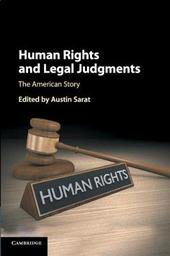
|
Human Rights and Legal Judgments: The American Story
Paperback / softback
Main Details
| Title |
Human Rights and Legal Judgments: The American Story
|
| Authors and Contributors |
Edited by Austin Sarat
|
| Physical Properties |
| Format:Paperback / softback | | Pages:155 | | Dimensions(mm): Height 229,Width 152 |
|
| ISBN/Barcode |
9781316648117
|
| Classifications | Dewey:341.480973 |
|---|
| Audience | | Professional & Vocational | |
|---|
| Illustrations |
Worked examples or Exercises
|
|
Publishing Details |
| Publisher |
Cambridge University Press
|
| Imprint |
Cambridge University Press
|
| Publication Date |
13 December 2018 |
| Publication Country |
United Kingdom
|
Description
Human rights can be defined as the basic fundamental rights inherent to all human beings in any society. How these rights are made available and protected in individual countries is an area of much study and debate. Focusing on the significance of human rights in American law and politics, this book seeks to understand when, where, and how American law recognizes and responds to claims made in the name of human rights. How are they used by social movements as they advance rights claims? When are human rights claims accommodated and resisted? Do particular kinds of human rights claims have greater resonance domestically than others? What cultural and psychological factors impede the development of a human rights culture in the United States? This is an exciting and engaging volume that will appeal to a broad range of scholars, practitioners, and students interested in the study of human rights.
Author Biography
Austin Sarat is William Nelson Cromwell professor of Jurisprudence and Political Science at Amherst College, Massachusetts. He is author or editor of over ninety books in the fields of law and political science. His book When Government Breaks the Law: Prosecuting the Bush Administration was named one of the best books of 2010 by The Huffington Post.
Reviews'This book incorporates work from scholars and practitioners, each of which make nuanced and bold arguments that are likely to be challenged by other academics. However, this is certainly a good thing. It will spark debates on the importance of human rights, which is imperative if progress is to be made on the domestic acceptance of international human rights in the US.' Alice Storey, Human Rights Law Review
|